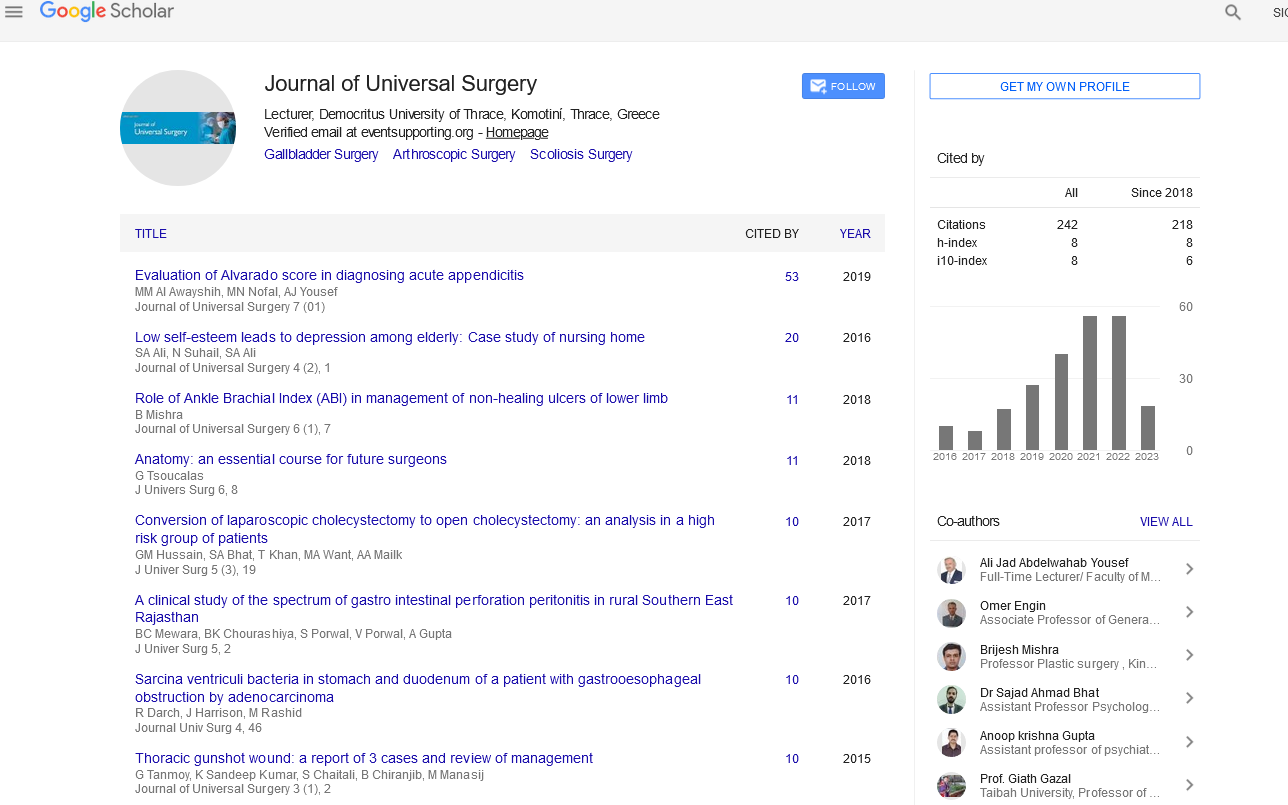Perspective - (2024) Volume 12, Issue 5
Risks Involved in Pediatric Surgery
Osric Discroll*
Department of Pediatric Surgeon, University of Ebeltoft, Ebeltoft, Denmark
*Correspondence:
Osric Discroll, Department of Pediatric Surgeon, University of Ebeltoft, Ebeltoft,
Denmark,
Email:
Received: 25-Sep-2024, Manuscript No. IPJUS-24-15225;
Editor assigned: 30-Sep-2024, Pre QC No. IPJUS-24-15225 (PQ);
Reviewed: 14-Oct-2024, QC No. IPJUS-24-15225;
Revised: 21-Oct-2024, Manuscript No. IPJUS-24-15225 (R);
Published:
29-Oct-2024
Introduction
Pediatric surgery, while essential for treating congenital and
acquired conditions in children, presents distinct risks and
challenges that set it apart from adult surgery. These risks stem
from the unique physiological, developmental and psychological
needs of pediatric patients. This article explores the potential
risks involved in pediatric surgery, focusing on complications
related to anesthesia, surgical errors, infections, psychological
impacts and long-term health outcomes.
Description
Anesthesia-related risks
Anesthesia is a crucial aspect of any surgical procedure, but it
carries particular risks in children. Pediatric patients are more
sensitive to the effects of anesthesia due to their smaller body
mass, rapidly developing organs and unique metabolic
processes. This sensitivity can lead to complications such as:
Respiratory issues: Children, especially infants, have narrower
airways, which makes intubation during surgery more
challenging. Incorrect intubation or airway management can
lead to respiratory distress or injury to the airway.
Cardiac complications: Pediatric patients have less developed
cardiovascular systems, which makes them more susceptible to
fluctuations in blood pressure and heart rate during surgery.
Post-anesthetic apnea: Newborns and premature infants are
at risk of experiencing apnea (breathing pauses) after anesthesia
due to the immaturity of their respiratory control systems.
Anesthesia awareness: Although rare, children may
experience anesthesia awareness, where they are conscious of
the surgery but unable to move or communicate, leading to
psychological traumas.
Surgical errors and complications
Despite advancements in pediatric surgery, surgical errors and
complications remain a significant concern. Some of the primary
risks include:
Bleeding and blood loss: Children have a much smaller total
blood volume compared to adults, meaning even minor bleeding
during surgery can lead to significant blood loss, requiring carefulmanagement by the surgical team.
Organ damage: Pediatric surgeons must be exceptionally
skilled to avoid damage to organs, particularly when operating
on smaller and more delicate anatomical structures. A slight
miscalculation can result in accidental injury to nearby organs,
blood vessels or nerves.
Malnutrition or dehydration: Children, particularly infants,
are more prone to dehydration or nutritional imbalances if a
surgery affects their ability to feed or digest food. Prolonged
fasting before surgery may also increase the risk of these
complications.
Wound healing issues: Young children may be more prone to
wound infections or poor healing, especially in cases of
malnutrition or underlying medical conditions. Surgical wounds
must be carefully monitored to avoid infection and ensure
proper healing.
Infections and immune system concerns
Children’s immune systems are still developing, making them
more vulnerable to infections both during and after surgery. The
risks includes:
Postoperative infections: The risk of infections increases with
the complexity and length of surgery. Surgical Site Infections
(SSIs) are a common complication and may lead to extended
hospital stays, additional treatments or even life-threatening
sepsis if not addressed promptly.
Hospital-Acquired Infections (HAIs): Pediatric patients,
particularly those who are immunocompromised or premature,
are at risk of contracting HAIs such as pneumonia, urinary tract
infections or bloodstream infections.
Viral and bacterial exposure: The hospital environment
exposes pediatric patients to various pathogens, which can be
problematic for those with weaker immune systems, especially
infants or children undergoing treatments like chemotherapy.
Developmental and long-term risks
Children are not just miniature adults; their bodies and brains
are still growing and developing, which means surgery can have
both immediate and long-term impacts on their development.
Some of these risks include.
Growth complications: Surgical procedures, especially those
involving bones, can disrupt the natural growth of children. For
example, surgeries that affect growth plates in bones may lead
to deformities or unequal limb lengths.
Neurological impacts: Pediatric patients, especially neonates
and infants, are at greater risk of developing neurological
complications after surgery. This could include developmental
delays, cognitive issues, or problems with motor function due to
factors such as hypoxia (lack of oxygen), infection or prolonged
anesthesia exposure.
Long-term health complications: Children undergoing surgery
for complex congenital conditions may face long-term health
challenges, such as chronic pain, organ dysfunction or repeated
surgeries as they grow.
Psychological and emotional risks
Surgery can be a frightening experience for any patient, but
for children, it can lead to heightened emotional distress. The
psychological risks include:
Preoperative anxiety: Children often experience significant
anxiety and fear before surgery. Separation from parents,
unfamiliar hospital settings and fear of the unknown can cause distress, which may complicate anesthesia induction and
postoperative recovery.
Post-traumatic stress: In some cases, children may develop
Post-Traumatic Stress Disorder (PTSD) after a traumatic surgical
experience. This can manifest as nightmares, behavioral changes
or avoidance of medical care in the future.
Long-term emotional effects: The long-term emotional and
psychological impact of pediatric surgery can persist into
adolescence and adulthood, particularly if the child underwent
multiple surgeries or faced complications during recovery.
Conclusion
Pediatric surgery, while often lifesaving, presents a unique set
of risks that must be carefully managed by the surgical team,
anesthesiologists, and healthcare providers. The physiological
differences between children and adults, coupled with the
emotional and psychological vulnerability of young patients,
make pediatric surgery a complex and delicate field. By
recognizing and mitigating these risks, healthcare teams can
improve surgical outcomes and minimize complications,
ensuring a safer experience for children and their families.
Citation: Discroll O (2024) Risks Involved in Pediatric Surgery. J Univ Surg Vol.12 No.5: 042.





